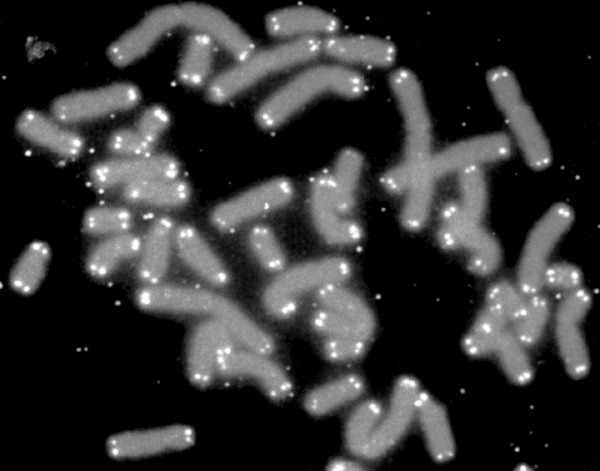A team at The Scripps Research Institute (TSRI) followed the trail of such a mutation in a gene called POT1. Today in Cell Reports the researchers, funded in part by CIRM, describe their identification of a novel mechanism for cancer progression in cells carrying the POT1 mutation and they also speculate on the development on a unique therapeutic strategy.
Chromosomes go to pot without POT1
The POT1 protein is one component of shelterin, a multi-protein structure that binds to and protects telomeres, a region of DNA found at the ends of chromosomes. The team found that when POT1’s function is disrupted by mutation, the telomeres become vulnerable to damage which leads to chromosome instability. As a result, many regions of DNA on the chromosomes get rearranged leading to further gene mutations that in turn can accelerate the process of cancerous growth.

Human chromosomes (grey) capped by telomeres (white) Wikipedia
However, in the case of POT1 mutations, the DNA damage in the unstable chromosomes stimulates an enzyme called ATR that’s known to shut down cell division and initiate apoptosis, or programmed cell death. Now, unless I’m missing something, cells that have either stopped dividing or even died would seem to be the opposite of cancer progression. So why then are POT1 mutations found in a number of cancers such as leukemia, melanoma (skin cancer) and glioma (brain cancer)? As TSRI Associate Professor Eros Lazzerini Denchi, a co-leader on the publication, mentions in a press release, this conundrum presented an opportunity to better understand POT1 related cancers:
Mutant POT1 and p53: diabolical partners in cancer progression
The team looked for answers by studying the POT1 mutation in the presence of a mutated form of the p53 tumor suppressor gene, found in over 50% of all human cancers. Mice bred with the POT1 mutation alone formed no cancers while those animals with the p53 mutation alone developed T cell lymphomas, a type of immune system cancer, by 20 weeks and survived 24 weeks. Mice with both mutations fared much worse with median survival times of just 17 weeks. So somehow the p53 mutation was bringing out the potential of the POT1 mutation to cause aggressive cancer growth.
Further experiments revealed that the p53 mutation quashed the ATR enyzme’s programmed cell death signal which the team had shown was stimulated by the POT1 mutation. As a result, the cells avoided programmed cell death. Because the cells had no mechanism to die, more cancer-causing mutations had the opportunity to develop from the chromosome instability caused by the POT1 mutation.
The bright side to this diabolical cooperation between mutant POT1 and p53 is that it presents a possible opening for new treatment strategies. It turns out that no cell, not even a cancerous one, can survive in the complete absence of ATF. Since cells with the POT1 mutations already have a reduced level of ATF, the authors suggest that delivery of low doses of ATF inhibitors, which have already been developed for the clinic, could kill cancer cells without affecting healthy cells. No doubt the team is eager to follow up on this hypothesis.
It’s comforting to know that there are crafty scientists out there who are closing in on ways to outsmart the sneaky tactics of cancer cells. And it wouldn’t be possible without this fundamental research, as Lazzerini Denchi points out:
